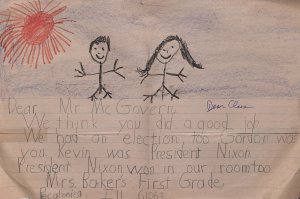The Seeley G. Mudd Manuscript Library has recently completed an 18-month project to process the papers of former Senator George S. McGovern. The collection is especially noteworthy for its comprehensive documentation of George McGovern’s lifelong work on food and nutrition issues.
McGovern served as the United States Representative for the First District of South Dakota from 1956-1960 and was a member of the House Committee on Agriculture, where he advocated strongly for issues that would characterize his entire political career, including rural development, food stamp legislation, and foreign food aid.
McGovern lost his first bid for the Senate in 1960 in part due to his political ties to Robert and John F. Kennedy, whose Catholic background was unpopular in South Dakota. In a phone call to his brother, John F. Kennedy said at the time "I think we just cost that nice guy a Senate seat," and subsequently offered McGovern a position in his administration as Special Assistant to the President. In that function, McGovern served as the director of the Food for Peace Program from January 1961-July 1962, leveraging the agricultural surplus of the U.S. to alleviate world hunger and improve foreign relations. When McGovern left office to run again for the Senate, Food for Peace was operating in twelve countries.
 |
Following the 1972 presidential election, George McGovern received an outpouring of support mail which included this letter from "Mrs. Baker’s First Grade" in Pecatonica, IL. |
In 1962, McGovern was elected to the United States Senate, where he served until 1981. He was a member of the Committee on Agriculture and Forestry and the Committee on Interior and Insular Affairs and from the start developed a strong stance on farm prices, rural development, and food programs. After 1967, when he assumed the chairmanship of the Subcommittee on Indian Affairs, McGovern also became an outspoken advocate for the rights of Native Americans and for improving education and employment opportunities on the reservations.
The collection gives insight into McGovern’s house and senate campaigns as well as his 1968 candidacy for the Democratic presidential nomination and his 1972 presidential campaign against Richard Nixon. Further highlights include the documentation of the Food for Peace Program (1961-1962) and McGovern’s activities as Chairman of the Senate Select Committee on Nutrition and Human Needs (1969-1970, 1973-1977) and the Subcommittee on Nutrition of the Senate Committee on Agriculture, Nutrition, and Forestry (1978-1980). Of special interest are records documenting McGovern’s activities as Chairman of the Subcommittee on Indian Affairs of the Senate Committee on Interior and Insular Affairs (1967-1972).
Over 1800 feet were processed through the support of the John Foster and Janet Avery Dulles Fund. An electronic finding aid is available on the Mudd Library’s website.
Click to see more images from this collection:
Memo from George McGovern’s 1972 campaign trail, addressed from Hillary Rodham to Don O’Brien and Bill Clinton. Both Clintons campaigned for McGovern in Texas.
Tom Daschle’s application for an internship with George McGovern’s office met with an unfavorable response. Daschle had campaigned for McGovern’s Senate re-election in 1968 and would eventually follow in McGovern’s footsteps as Democratic U.S. Senator from South Dakota.

